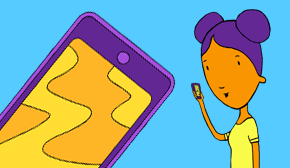E-Learning
From the 5/6 classrooms

E-Learning
From the 5/6 classrooms
Online interactions are becoming as important as face-to-face ones. As a result, we need to learn how to manage our online relationships and develop good ‘netiquette’.
Why do we need 'netiquette'?
The strength of online relationships mirrors the best and at times, the worst, of face-to-face relationships. As we know, things published online are often difficult, if not impossible, to remove.
Almost two thirds of children have had a negative experience online and 20 percent feel badly about something they have done online. In fast-paced heated interactions in chats on social media, people who are usually friendly and positive can sometimes post nasty and hurtful comments.
We need to develop 'netiquette' - standards of behaviour for people online. Netiquette is about relationships and how people behave, rather than about particular websites or pieces of technology.
The 'nanna rule'
Online actions have real life consequences. If you wouldn’t do it in real life, don’t do it online. Use the ‘nanna rule’ - if you wouldn’t want your nanna to know about it, don’t put it on the web!


For students
The following tips may be useful for dealing with hurtful or nasty comments, or situations that make you feel uncomfortable online.


For parents
The main reason young people do not tell their parents when these situations occur online is because they fear they will lose access to their device.
Parents should let their children know that they will help them to cope with upsetting events online but won’t insist they stop using the device.
Behavioural change is important to pay attention to. While it is tempting to take away the screens, this is not always such a great idea. It is better to ensure devices are in a shared space, and impose some limits, such as a turn off time.
For more information visit - https://www.education.vic.gov.au/about/programs/bullystoppers/Pages/princyber.aspx